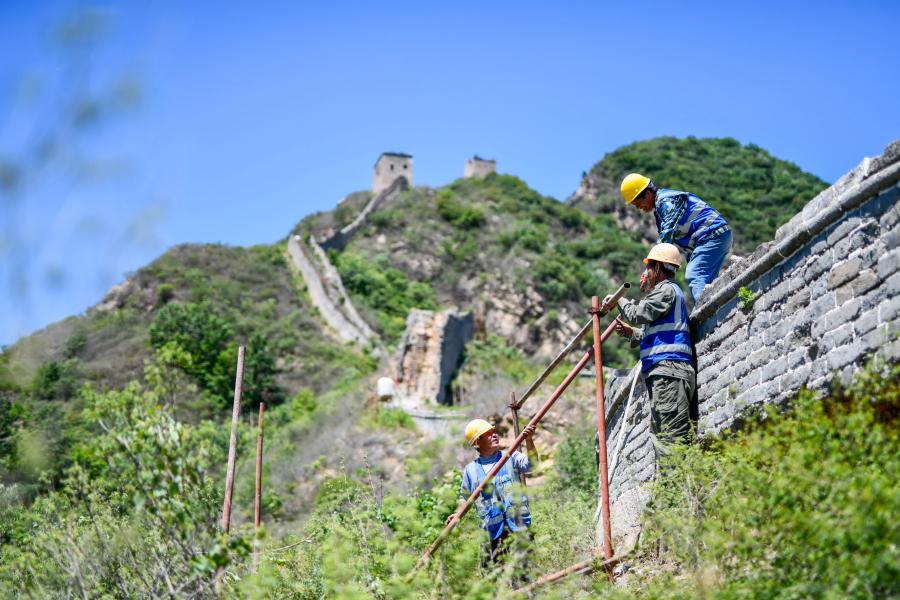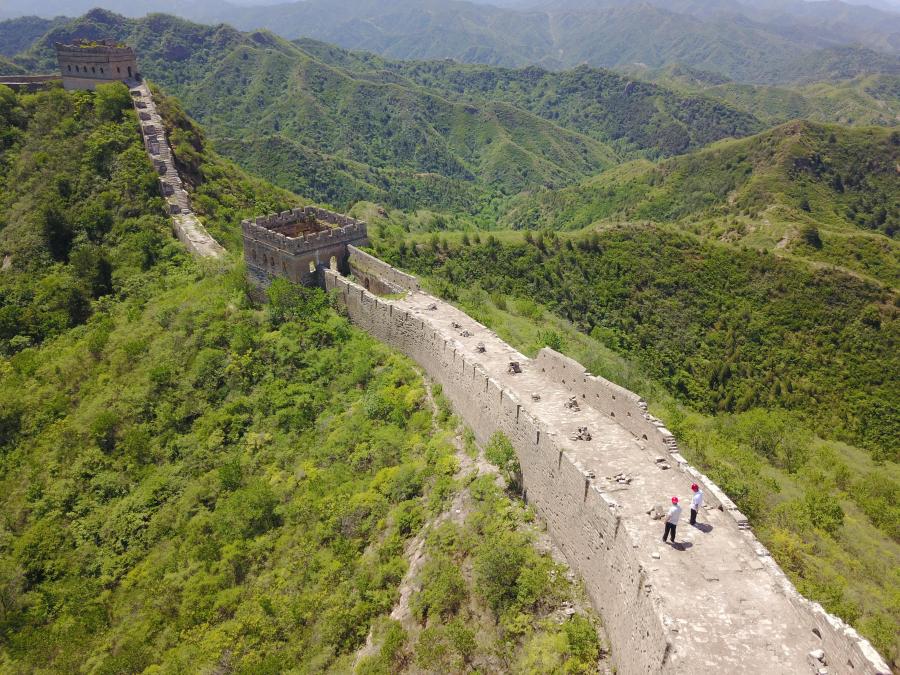Great Wall protection, a race against time
-- The Great Wall, as one of the world's great wonders, was built during more than 2,000 years of continuous construction, from the Spring and Autumn Period (770 BC-221 BC) to the Ming Dynasty (1368-1644). The existing sections have a total length of over 21,000 km.
-- Wednesday will coincide with the 15th anniversary of China's national regulation on the Great Wall protection.
-- A growing number of rangers have been organized to protect the UNESCO World Heritage Site. There are currently more than 6,000 of them.
Dec.1 will coincide with the 15th anniversary of China's national regulation on the Great Wall protection.
With the regulation, the central government and local authorities in 15 provinces, autonomous regions, and municipalities along the Great Wall reinforced the comprehensive protection of the national treasure.
Under the regulation, a growing number of rangers have been organized to protect the UNESCO World Heritage Site. There are currently more than 6,000 of them.
 Renovation workers operate at the site of a section of the Great Wall at Panjiakou reservoir in Kuancheng Manchu Autonomous County, north China's Hebei Province, on June 3, 2021. (Xinhua/Mu Yu)
Renovation workers operate at the site of a section of the Great Wall at Panjiakou reservoir in Kuancheng Manchu Autonomous County, north China's Hebei Province, on June 3, 2021. (Xinhua/Mu Yu)
The rangers, usually farmers living near the Great Wall sites, conduct safety inspections of the key wall sections, stop and report harmful behavior, and offer advice on the protection work.
GUARDIANS OF GREAT WALL
After the first snowfall in early November, Zhang Heshan, 66, immediately patrolled the Great Wall in Chengziyu Village of Qinhuangdao City, north China's Hebei Province.
"After snowfalls, patrols should occur in time to check whether snow melting is harmful to the ancient wall," said the veteran Great Wall ranger.
Zhang is also an adept live-streamer narrating his observation during his Great Wall patrol. He has 370,000 fans on his account at China's short-video platform of Douyin (the Chinese version of TikTok).
Zhang has involved himself voluntarily in the Great Wall protection since 1978.
 Zhang Heshan patrols the Chengziyu Great Wall in Qinhuangdao, north China's Hebei Province, Aug. 20, 2020. (Xinhua/Mu Yu)
Zhang Heshan patrols the Chengziyu Great Wall in Qinhuangdao, north China's Hebei Province, Aug. 20, 2020. (Xinhua/Mu Yu)
On each patrol, he had to walk over 20 km of mountain roads, during which he advised shepherds to keep away from the ancient wall and persuaded people who coveted the wall bricks to leave the relics alone.
Zhang has written notes with a total of 200,000 Chinese characters on the Great Wall protection.
Meandering on mountain ridges across north China, the Great Wall, one of the world's great wonders, was built during more than 2,000 years of continuous construction, from the Spring and Autumn Period (770 BC-221 BC) to the Ming Dynasty (1368-1644). The existing sections have a total length of over 21,000 km.
Li Chunjie and 107 other veterans have joined a volunteer group to protect the Great Wall in Qian'an City, Hebei.
"My village is at the foot of the Great Wall. I can see it whenever I look up," Li said.
The 57-year-old veteran said Xuliukou Village used to be an impoverished and backward mountain village. Great Wall tourism has brought fortune to its residents.
Li said many fellow villagers have set up B&B and tourist businesses. Veteran volunteers are enthusiastic about getting involved in the Great Wall protection, picking up garbage, and clearing weeds.
Jin Ruiqing, director of the veteran affairs department in Qian'an, said the veteran volunteer group has contributed to protecting the Great Wall and cultural and tourism development.
NEVER-ENDING CONSERVATION
During the 14th Five-Year Plan period (2021-2025), the building of the national cultural parks with themes including the Great Wall and the Yellow River has been included in the country's cultural projects.
The Ministry of Culture and Tourism has required 15 provinces and municipalities along the Great Wall to formulate specific plans of building the Great Wall national cultural parks according to local conditions.
 Aerial photo taken on June 11, 2021, shows technicians checking the condition of the Jinshanling Great Wall in Luanping County, north China's Hebei Province. (Photo by Wang Liqun/Xinhua)
Aerial photo taken on June 11, 2021, shows technicians checking the condition of the Jinshanling Great Wall in Luanping County, north China's Hebei Province. (Photo by Wang Liqun/Xinhua)
As a key construction area of the parks, Hebei Province has made four sections of the Great Wall, including the Shanhaiguan Pass in Qinhuangdao, a top priority.
"We adhere to the principle of 'minimum intervention' while protecting the authenticity, integrity, and ancient historical features of the Great Wall," said Zhang Yong, senior engineer of the Hebei provincial ancient architecture protection research institute.
The school of architecture, Tianjin University, has been building an image and three-dimensional database of the Great Wall. The school has completed digital archives of Great Wall sections stretching 5,500 km since 2018.
Zhang Peng, 34, is a new-generation Great Wall ranger that uses new technologies such as drones and big data to guard the cultural heritage.
Zhang said drones can take 360-degree and 3D images of the Great Wall, and that he can also remind unruly tourists to refrain from causing any damage to the Great Wall with the speaker on the drones.
"We put the information collected by the drones into a database, and the accumulated data will clearly show changes of the Great Wall over time," he added.
"The Great Wall belongs to both China and the rest of the world," said Li Zhe, a researcher at the school of architecture, Tianjin University. "We should improve its protection with science and technology and spread the Great Wall culture to the world." ■
(Video reporters: Luo Xuefeng and Gao Bo; video editors: Zhao Xiaoqing and Zhu Jianhui)